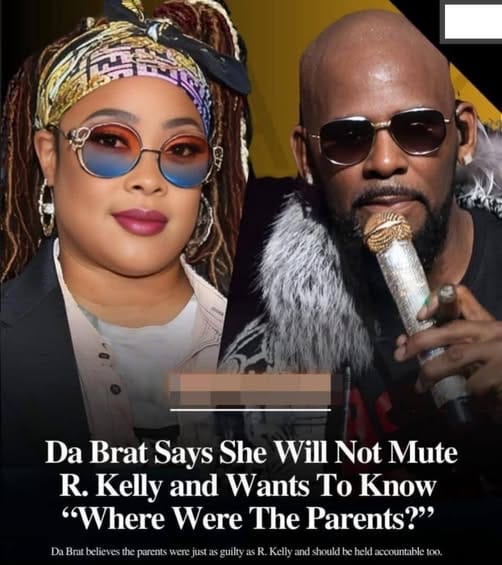A new wave of online conversation erupted after Da Brat shared her thoughts about R. Kelly’s music, sparking intense debate across social media. During a recent discussion, she addressed the ongoing controversy surrounding the artist and explained why she personally struggles to stop listening to the music she grew up with. Her comments quickly became a trending topic, drawing in supporters, critics, and those who were simply trying to understand her perspective.
Da Brat’s remarks centered on a question she echoed from many people who have followed the case for years: “Where were the parents in all of this?” With those words, she touched on a point that has divided the public—accountability, responsibility, and how complex situations involving minors, guardians, and powerful entertainers can be. While her intention appeared to be a search for clarity, the reaction online showed just how emotionally charged the topic remains.
Social media users responded with a wide range of opinions. Some felt that her comments were an attempt to redirect blame or minimize the seriousness of the allegations, while others interpreted her statements as part of a larger conversation about protecting young people and recognizing the role adults must play in safeguarding minors. The debate highlighted how sensitive and layered these discussions can be, especially when they involve trauma, legal history, and celebrity influence.
Another element that ignited conversation was her admission that she still listens to R. Kelly’s music. Many fans from her generation expressed that they understood the conflict she described—separating the art from the artist is a challenge that has surfaced repeatedly in public discourse. Songs that once formed the soundtrack of people’s lives can become complicated when the artist behind them becomes the center of serious accusations or legal consequences. Da Brat’s honesty about her internal struggle added fuel to an already complex discussion.
Others online emphasized that choosing whether or not to listen to an artist after public controversy is a personal decision, but one that often carries emotional weight. Some listeners feel they can separate memories tied to music from the actions of the musician, while others believe that supporting the music indirectly supports the individual behind it. Da Brat’s comments placed her squarely in the middle of this cultural debate, unintentionally prompting thousands of people to re-examine their own views.
The conversation also reopened broader questions about accountability in the entertainment industry. Many commenters pointed out that conversations about responsibility should include not only the artists, but also the adults, institutions, and systems that may have failed to protect vulnerable individuals. For some, Da Brat’s “Where were the parents?” comment was an invitation to revisit how complex, layered, and painful these situations can be. For others, it felt misplaced or insensitive, showing how perspectives can differ widely depending on lived experience.
In the midst of the debate, several voices urged for balanced discussion—acknowledging the harm that has been publicly documented while also recognizing that emotional connections to music from the past can be deeply personal. The topic reminds people that cultural memory, trauma, justice, and personal nostalgia often collide in unexpected ways.
As reactions continue to unfold online, one thing remains clear: Da Brat’s comments have reignited a powerful and emotional conversation about responsibility, art, memory, and the impact of public figures on society. Whether people agree or disagree with her perspective, the discussion reflects how deeply these issues resonate and how challenging it can be to navigate them in a world shaped by both accountability and personal attachment.
